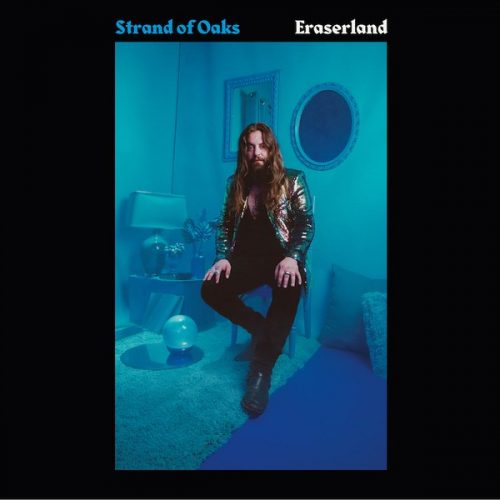Where is “Eraserland”? Is it the place where we go to forget things, or the place in which the things we think we need are wiped away to make room for new and better things? Perhaps in some mobius-strip infinity logic those two places are one and the same: one where we allow for the removal of things, even when it’s difficult, and in which our reward is that we are able to forget the past. Timothy Showalter’s seventh album as Strand of Oaks asks us to contemplate that “Eraserland” isn’t a place at all.
The opener “Weird Ways” serves as a proof of concept for the value in expectation management: After the opening line of “I don’t feel it anymore” against a guitar strumming alone, the song’s hero realigns his perception as an E-Street’s worth of instruments coalesces around him realizing that “when you wake up it’s closer than you think.” This catalyzes a cascading drum build that cycles upward toward halcyon futures and gives the song a newfound sense of purpose, one born seemingly of nothing but momentum. We can all understand the frustration of not feeling it for whatever reason, but there is a reminder here that sometimes all it takes is a refreshed perception to change circumstances from a proverbial albatross around the neck into a phoenix that carries us out of the ashes and onto rebirth and glory.
“Hyperspace Blues” kicks off with a chip on its shoulder and some adventurous synth work straight out of an ’80s sci-fi movie whose ideas far outpace its execution. The shift into overdrive is reminiscent of Amen Dunes’ 2018 album “Freedom,” as on that album there is a looseness here and a willingness to throw off shackles in order to allow sounds that seem out of place in these surroundings. Elsewhere, Showalter channels his inner Craig Finn on “Moon Landing,” equating a relationship to a bummer drug transaction, imbuing characters with “futuristic eyes” and interpreting his own fall into apathy with an authorial sense of tragic comedy (“I became the cynic all at once I felt relieved”) before the ending drives off a cliff on purpose in a cacophonous haze of muffled distortion. However, his engagement with this story is not from some ivory tower behind a typewriter, he eschews preaching with the authority of a preacher interpreting the word to instead bask in the bloodshot been-there-done-that truth of a recovering addict who sees the threat of backsliding around every dark corner.
The album’s quieter moments are cut from similar cloth. Veering convincingly between the sonic guardrails of Mazzy Star (the contemplative steel guitar warble of “Keys”) and Nick Drake (the understated boy-and-his-guitar showcase “Wild and Willing”), their ultimate payoff is achieved most satisfyingly on “Ruby,” where the instruments pull the rug out from what began as a mid-tempo rocker, exposing an emotional core that seems to explode from nowhere in the middle of the song. The recovery from this cathartic moment is fleeting as the track is again overtaken by negative space and a mournful piano-and-drum coda. Breathing space is essential here, offering a shelter in which to retreat from a storm that’s uprooting trees on the five o’clock news. Additionally, the closing “Forever Chords” is a masterclass in dynamics, building from a gobsmacking piano melody that evokes early-’90s adult contemporary (think Don Henley playing a song written by Bonnie Raitt and you’re getting close) into a bracing and anthemic declaration of the importance of love and self-acceptance.
The penultimate title track begins as another moment of uneasy tranquility with Showalter lamenting that the “world’s in a tailspin” over David Lynch-ian synthscapes and drums that sound like they were recorded in a reverb chamber downstairs from the literal center of the earth. But the effect works in the opposite way here from other mellower tracks as this one constructs a heavyhearted liftoff out of shredding guitars and ascendant melodies — the quietude has been but prologue to a new mode of thought entirely: the freedom of being christened anew and cut out of context like a paper doll cut from a magazine page. It is here where we get the definition of “Eraserland”: “I am the Eraserland, I can start again.” Strand of Oaks pulls back the curtain to show that “Eraserland” was never a place, it is a state of being where picking oneself up is infinitely more important than getting knocked down, a place where we dust ourselves off and wring the sweat out of our bandanna as we ponder our ongoing march toward the sun. It’s realizing that we get it wrong sometimes when we think that moving forward is about the movement. More often than not, it’s about the decision to move.
Rating: 73/81



Leave a Reply